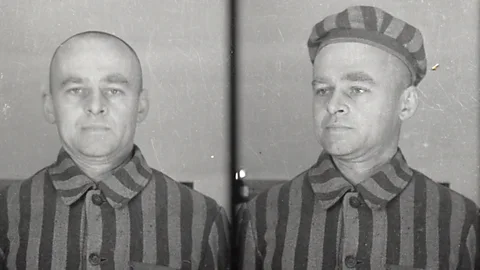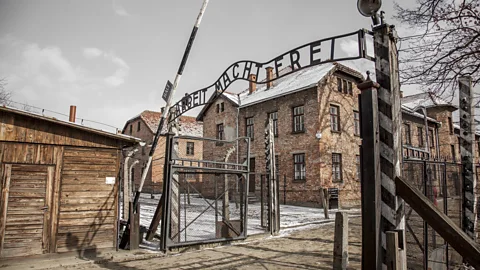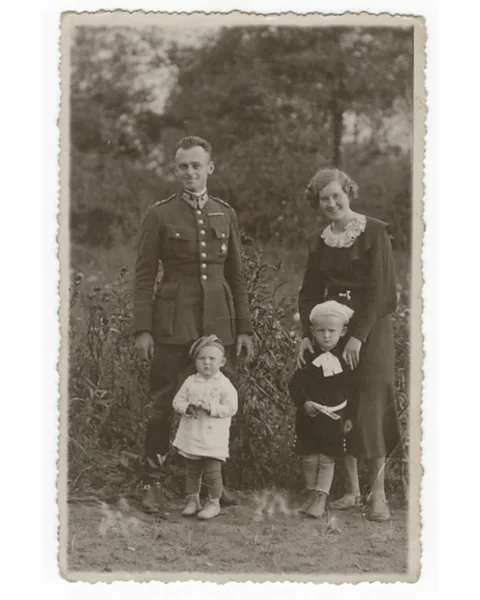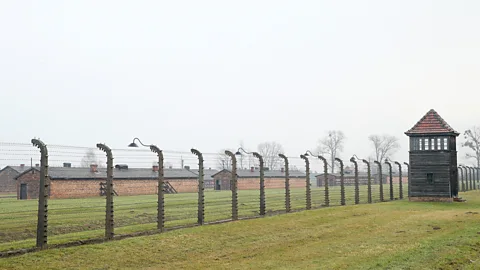The man who revealed Auschwitz's atrocities to the world
 Archive of The State Museum Auschwitz-Birkenau in Oświęcim
Archive of The State Museum Auschwitz-Birkenau in OświęcimOne man's daring mission to infiltrate Auschwitz revealed its atrocities to the world – this is his story.
On 27 January 1945, prisoners at the main camp of Auschwitz watched as the soldiers of the First Ukrainian Front came and opened the gates under the mocking words of "Arbeit Macht Frei" ("Work Makes Freedom"). After more than four years of terror, they were finally being set free.
This year marks the 80th anniversary of the liberation of the most notorious war-time concentration camp in the world, where more 1.1 million people, mostly Jews, were murdered on these grounds.
Auschwitz was established in 1940 when Nazi Germany opened a new camp complex in Oświęcim in southern Poland to hold prisoners. What began as a political prison of Polish nationals evolved into a death factory of Europe's Jews, and the name Auschwitz would soon become synonymous with genocide and the Holocaust. During its first year of operation, little was known about the camp's activities, until one man decided to risk his life to find out.
To the guards and other prisoners, this man was Tomasz Serafiński, prisoner number 4859, a dissident who happened to be in the wrong place at the wrong time. But to a small group of an underground resistance group against Nazi Germany, his name was Witold Pilecki, second lieutenant in the army, an intelligence agent, a husband and father to two children and a Catholic.
"Witold Pilecki was one of the founders of the resistance movement organisation called the Secret Polish Army – TAP, for short," said Dr Piotr Setkiewicz, historian at Auschwitz-Birkenau Memorial and Museum. "When TAP had news of the new Auschwitz camp, discussions began about sending someone there to find out what was happening there. Pilecki agreed to take on this task."
 Getty Images
Getty Images"It should be emphasised that at that time no one in TAP knew what Auschwitz was," Setkiewicz continued. "It was only then that the first telegrams informing about the deaths of people deported in the first transport from Warsaw began to arrive."
However, Pilecki needed a plan to get in. So, on a September day in 1940 he arranged to be in his sister-in-law's apartment in Warsaw's Żoliborz neighbourhood during a police raid and used the Jewish identity of a deceased Polish soldier to ensure he was arrested. Three days later, Pilecki was marched through the gates inscribed with the infamous "Arbeit Macht Frei", where he would spend the next two and a half years infiltrating the camp and sending evidence to warn the world about its activities, all the while subjected to the hard work, hunger and risks of death like any other prisoner.
Commemorating the anniversary
The Auschwitz-Birkenau Memorial and Museum will be holding a day of memorial ceremony on 27 January 2025 with the attendance of worldwide dignitaries. International visitors will be able watch from a special tent area on this day; information about public access to the event can be found on 80.auschwitz.org.
He wrote reports that were smuggled out of the camp, including information on the conditions, the tortures and the deaths. At the same time, he inspired an underground movement that sabotaged facilities and assassinated SS officers while arranging for contraband food and medicine to be brought in.
Other than his sister-in-law, his family had little idea about his military activity.
"We had a pretty pale idea that Dad was doing some important tasks, but certainly we, as children, didn't know what kind. Whether Mum knew anything more, I'm not sure, but I suppose she didn't know the details of Dad's tasks either," said Pilecki's daughter, Zofia Pilecka-Optułowicz. "The conspiratorial requirements were that for the safety of both Dad and ourselves, the less we knew, the better."
 Zofia Pilecka-Optułowicz
Zofia Pilecka-OptułowiczIn his reports, Pilecki highlighted the reality of Auschwitz and requested that Allied Forces attack the camp. Although the documents did reach some of the top commanders, they were mostly ignored since Poland wasn't a military priority. Even on the day of the camp's eventual liberation, the Red Army only became aware of the camp by chance after freeing nearby city of Krakow.
Although Pilecki's testimonies did not directly lead to the camp's liberation, they did create the first mass conspiracy about the conditions there. He was the first to bring firsthand information on the tortures and the deaths of prisoners to the world three years before Allied commanders officially recognised the camp's existence. It took another two years after his escape for the surviving prisoners of Auschwitz to be rescued. By then, out of a total of almost 1.1 million people brought to the camp, only around 7,000 saw freedom.
Pilecki became known as "the man who volunteered for Auschwitz", although his story would not be widely told for many years. After the war, Poland came under Soviet rule and Pilecki and his underground unit continued to fight for Polish independence in the Warsaw Uprising. He was evenutally arrested, forced to sign a confession as a traitor and was secretly executed in jail in 1948. Mentions of Witold Pilecki were forbidden and the reports and documents of his actions were destroyed or filed away.
A message from the Auschwitz Foundation
It's important to understand that the site of the former camp – today a Memorial and Museum – is a preserved authentic space that bears witness to one of the greatest tragedies in human history. We urge all visitors to approach their visit with the utmost respect. We hope that for them, their visit will become a moment of reflection and learning. We encourage people to take the time to educate themselves on the history of Auschwitz before their visit.
As Pilecka-Optułowicz and her brother Andrej listened to reports of Pilecki's trial and execution on the radio, they grew up being told their father was a traitor and enemy of the state. It wasn't until the 1990s that they found out their father had been a hero all along.
Pilecka-Optułowicz has memories of her father being a kind but stern man. A man of principle who loved his family. "I remember very clearly the many conversations I had with my father about nature – how the chain of life works, how important all the creatures in that chain are," she said. "He also showed me the world in a friendly and loving way and told me how to behave in different situations… he instilled in us that punctuality and truthfulness were particularly important. I have carried these lessons all my life."
 Getty Images
Getty ImagesSoviet Communism ended in Poland in 1989 and Pilecki's real story was finally told. Books were published about him, streets were named after him and his story was taught in Polish schools. A Pilecki Institute was established to research 20th-Century Polish political history and honour those who gave aid to Polish nationals in difficult times, and Pilecki's story forms part of the exhibits at the Auschwitz-Birkenau Memorial and Museum.
A tour of the museum is an emotionally intense experience; a raw account of the cruelty human beings are capable of against each other. Dorota Kuczyńska has been working at the museum as a guide and press officer for 27 years and finds her role both challenging and emotionally taxing. Her job involves not just guiding and storytelling, but also at times, meeting and listening to friends and relatives of previous prisoners who lost family members here.
"This is an extraordinary place, and the subject matter we address during visits is incredibly demanding and sombre," she said.
However, she adds that it has many rewarding moments. "Seeing young people who not only listen to the history of the past but also engage in discussions about the present and how to build a world based on respect, empathy and truth gives us hope for humanity and motivates us to continue this vital work."
CORRECTION: A previous version of this article incorrectly identified Tomasz Serafiński as a Jew. This has now been changed.
--
If you liked this story, sign up for The Essential List newsletter – a handpicked selection of features, videos and can't-miss news, delivered to your inbox twice a week.
